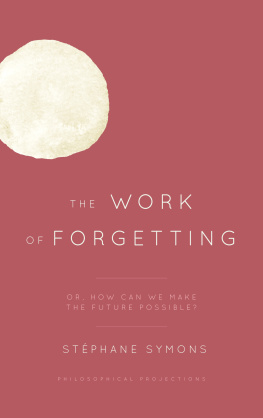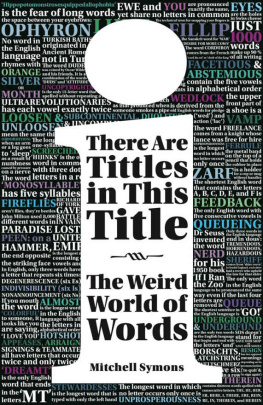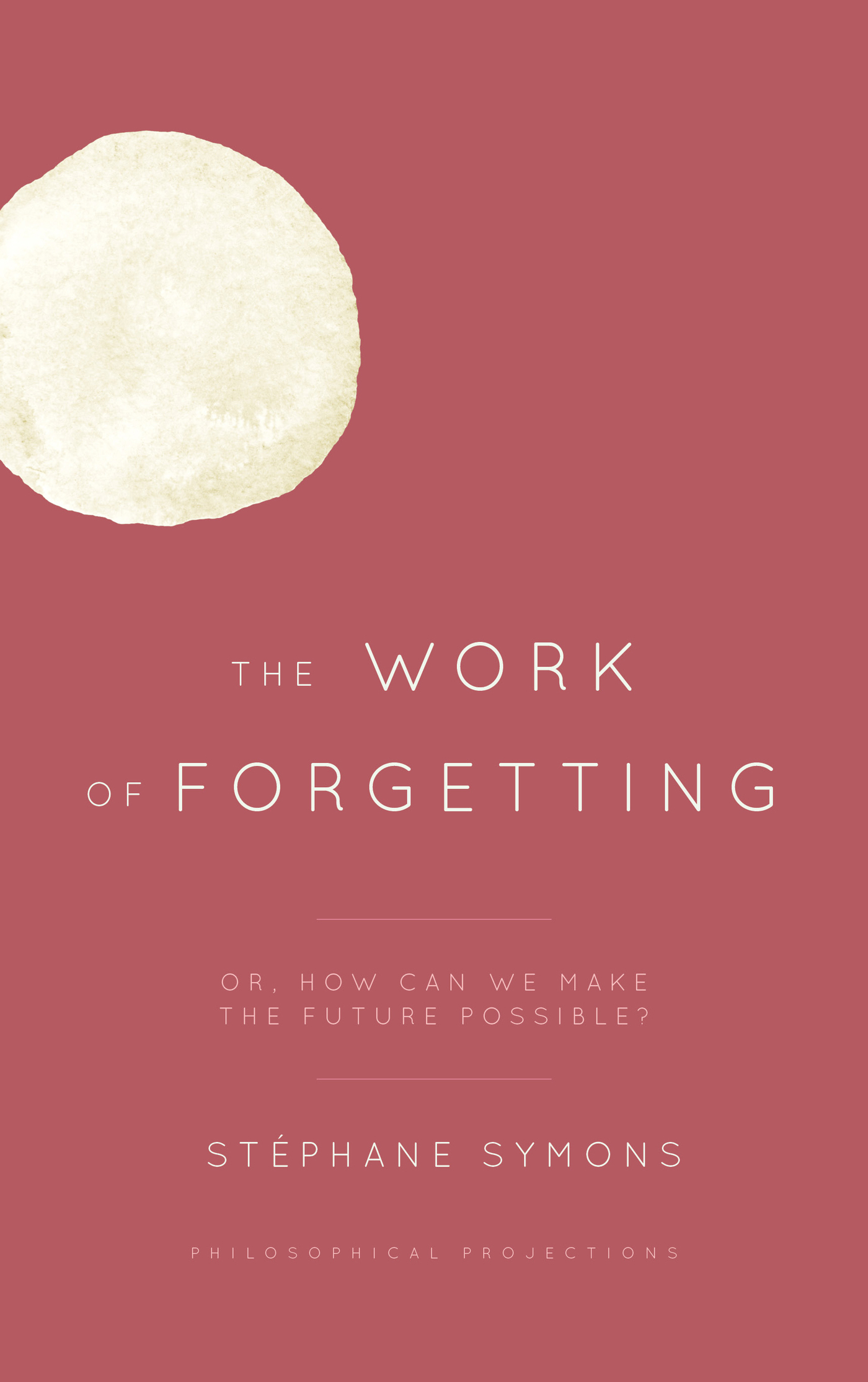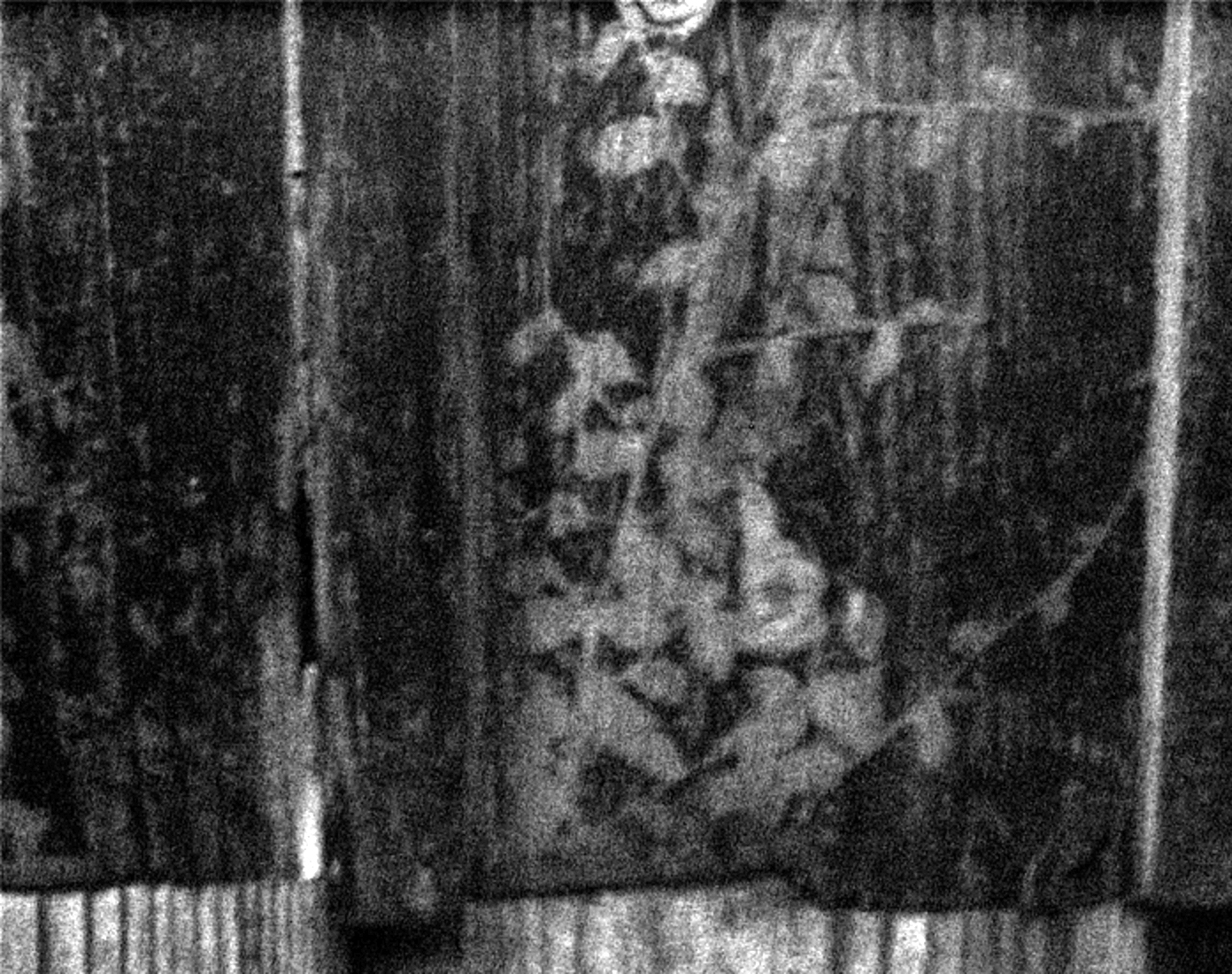The Work of Forgetting
Philosophical Projections
Series Editor: Andrew Benjamin, Distinguished Professor of Philosophy and the Humanities, Kingston University, UK, and Professor of Philosophy and Jewish Thought, Monash University, Australia
Philosophical Projections represents the future of Modern European Philosophy. The series seeks to innovate by grounding the future in the work of the present, opening up the philosophical and allowing it to renew itself, while interrogating the continuity of the philosophical after the critique of metaphysics.
Titles in the Series
Foundations of the Everyday: Shock, Deferral, Repetition, by Eran Dorfman
The Thought of Matter: Materialism, Conceptuality and the Transcendence of Immanence, by Richard A. Lee
Nancy, Blanchot: A Serious Controversy, by Leslie Hill
The Work of Forgetting: Or, How Can We Make the Future Possible?, by Stphane Symons
The Work of Forgetting
Or, How Can We Make the
Future Possible?
Stphane Symons

London New York
Published by Rowman & Littlefield International, Ltd.
6 Tinworth Street, London SE11 5AL
www.rowmaninternational.com
Rowman & Littlefield International, Ltd. is an affiliate of
Rowman & Littlefield
4501 Forbes Boulevard, Suite 200, Lanham, Maryland 20706, USA
With additional offices in Boulder, New York, Toronto (Canada), and London (UK)
www.rowman.com
Copyright 2019 by Stphane Symons
All rights reserved. No part of this book may be reproduced in any form or by any electronic or mechanical means, including information storage and retrieval systems, without written permission from the publisher, except by a reviewer who may quote passages in a review.
British Library Cataloguing in Publication Information
A catalogue record for this book is available from the British Library
ISBN: HB 978-1-78552-323-6
Library of Congress Cataloging-in-Publication Data Available
ISBN: 978-1-78552-323-6 (cloth : alk. paper)
ISBN: 978-1-78552-324-3 (electronic)
 TM The paper used in this publication meets the minimum requirements of American National Standard for Information SciencesPermanence of Paper for Printed Library Materials, ANSI/NISO Z39.48-1992.
TM The paper used in this publication meets the minimum requirements of American National Standard for Information SciencesPermanence of Paper for Printed Library Materials, ANSI/NISO Z39.48-1992.
Printed in the United States of America
Acknowledgements
First, I would like to thank all my colleagues at the Institute of Philosophy, in particular Roland Breeur, Paul Cortois, Paul Moyaert and Steven Spileers.
I would also like to thank the colleagues from the Faculty of Arts, in particular Barbara Baert, Anneleen Masschelein, Bart Philipsen and Hilde Van Gelder, and Junji Hori, Takeshi Kadobayashi, Noriaki Kuwata and Yoshi Takemine.
For encouraging remarks along the way, I would like to thank Ulrich Baer, Colby Dickinson, Howard Eiland, Martin Jay, Nathan Ross and Dimitris Vardoulakis. I thank Andrew Benjamin for his support of this project and for his invitation to publish the book in the series Philosophical Projections.
Thanks are due to Willem Styfhals for his interesting remarks on the relation between Walter Benjamin and Gershom Scholem.
I thank Laura Smith and Jiha Kang for their help in preparing the manuscript and Hannah Fisher, Sarah Campbell, Rebecca Anastasi and their colleagues at Rowman & Littlefield International for their confidence in the project and their professionalism.
Though the argument has been modified, sections of the conclusion were published earlier in my article In Praise of Shadows: Commemorative Images and the Atomic Bomb, in Image and Narrative 14 (1) (2013): 1934.
Infinitely more than thanks are due to my parents, my brother, sister, brother-in-law, family-in-law and friends.
This book, and its author, are dedicated to Tammy Lynn Castelein and Arthur Francis Symons.
Introduction
The Work of Forgetting.
Or, How Can We Make the Future Possible?
How to begin a book that considers the possibility to begin? Where to make a start when making a start, and the issue of natality, are among the main topics that this book will look into.
We could, for instance, begin with a reference to an ending. Or even the subject of death. For example, we could begin with the epilogue to a book of more than eight hundred pages, Tony Judts monumental study Postwar: A History of Europe since 1945. In this epilogue, entitled From the House of the Dead: An Essay on Modern European Memory, the British historian mentions the often-heard idea that the first decades of the twenty-first century are still determined by some of the darkest events that occurred in the previous century. Extermination, writes Judt, is the pertinent European reference and Holocaust recognition... our contemporary European entry ticket. If we can commemorate an event, we assume, it surely has not come to nothing. The remembrance of the past in books and in monuments, in thoughts and in images, may not necessarily work to make it meaningful but doesnt it affirm the human capacity to nevertheless somehow go beyond it? Because memory is ultimately wedded to such a belief in continuation and preservation, Judt suggests, it cannot in the end be trusted to testify to the extreme violence of the Holocaust.
In contrast to the confidence in the powers of memory, history starts from the sharp awareness that what ultimately matters the most has, to be sure, been lost. [H]istory contributes to the disenchantment of the world.
In the final paragraph of his epilogue, Judt suggests that the one true antidote against the disruptive pattern of history should be found within history itself, rather than in a counter-power such as memory. For Judt, the forgetting that is inscribed within the course of history (understood as the passage of time, history as Vergangenheit) cannot be countered by the conserving work of memory but only by the always interrupted and productive work of history itself (understood as the professional study of the past, history as Geschichte). While the attempt to save the horrors of the past from oblivion through historiography is no less threatened by oblivion than those horrors themselves, this attempt can and should nonetheless be ceaselessly renewed. It is therefore the very force of history, rather than memory, which will open into a process of learning and relearninga process that will never be fully accomplished.
Impossible to remember [the Nazi-evil] as it truly was, it is inherently vulnerable to being remembered as it wasnt. Against this challenge memory itself is helpless.... If in years to come we are to remember why it seemed so important to build a certain sort of Europe out of the crematoria of Auschwitz, only history can help us.... If Europeans are to maintain this vital linkif Europes past is to continue to furnish Europes present with admonitory meaning and moral purposethen it will have to be taught afresh with each passing generation. European Union may be a response to history, but it can never be its substitute.















 TM The paper used in this publication meets the minimum requirements of American National Standard for Information SciencesPermanence of Paper for Printed Library Materials, ANSI/NISO Z39.48-1992.
TM The paper used in this publication meets the minimum requirements of American National Standard for Information SciencesPermanence of Paper for Printed Library Materials, ANSI/NISO Z39.48-1992.
